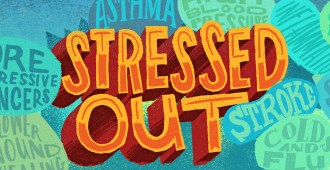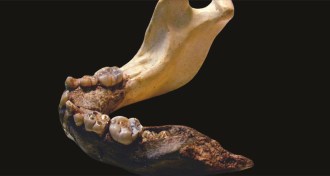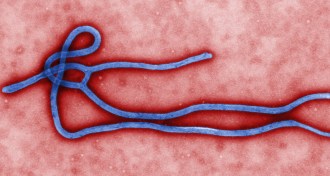Humans
Sign up for our newsletter
We summarize the week's scientific breakthroughs every Thursday.
-
 Health & Medicine
Health & MedicineEarly peanut exposure can reduce likelihood of allergy
In many infants at risk of developing a peanut allergy, early and steady exposure to peanut butter prevents it, a new study finds.
By Nathan Seppa -
 Ecosystems
EcosystemsBubonic plague was a serial visitor in European Middle Ages
Outbreaks of Black Death in medieval Europe may have been triggered by faraway weather patterns and hungry gerbils.
-
 Science & Society
Science & Society‘This Idea Must Die’ singles out scientific theories ready for retirement
Researchers and writers weigh in on theories getting in the way of scientific progress in this collection of essays.
-
 Health & Medicine
Health & MedicineSix ways to beat chronic stress
Counseling, mindfulness training and purposeful social contact may counteract the effects of chronic stress.
By Nathan Seppa -
 Health & Medicine
Health & MedicineChronic stress can wreak havoc on the body
Scientists are shedding light on all the ways that chronic stress can boost inflammation and lead to serious health problems.
By Nathan Seppa -
 Psychology
PsychologyGene variant may foretell success in program for at-risk kids
Disruptive children with DNA twist show biggest turnaround with 10-year intervention.
By Bruce Bower -
 Health & Medicine
Health & MedicineThere’s more than one way to persuade people to vaccinate
Fear, facts and attitude are all strategies for promoting immunization
-
 Health & Medicine
Health & MedicineNew HPV shot fends off more types of the virus
A new vaccine that covers more strains of the human papillomavirus protects better against cervical and other cancers.
By Nathan Seppa -
 Anthropology
AnthropologyFossil teeth flesh out ancient kids’ varied growth rates
X-ray technique sheds light on hominids’ developmental variety.
By Bruce Bower -
 Tech
TechFacebook detects signs of postpartum depression
An analysis of Facebook activity can identify new moms with postpartum depression.
-
 Genetics
GeneticsEbola virus evolution tracked by genetic data
Analysis of Ebola genomes shows how the virus has evolved and some of the mutations that may thwart treatments.
-
 Health & Medicine
Health & MedicineE-cigarettes may be gateway to addiction for teens
Teenagers are using e-cigarettes more than any other tobacco product and for many, it’s the first time they’ve tried a tobacco product at all.